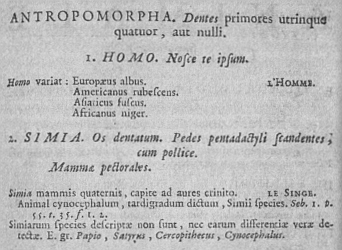 |
| H O M O. Nosce te ipsum |
Systema Naturae lists more than 10,000 species of plants and animals and introduced Linnaean taxonomy.
Linnaean taxonomy became the foundation for biological nomenclature and provides the hierarchical basis for how we classify animals, plants, bacteria and other organisms including ourselves, homo sapiens.
Human classification gets revised as we unearth more bones and fossils.
You are truly home only when you find your tribe.Like others animals, the classification of homo sapiens is illustrated by a taxonomic chain that starts in the broad classification of the animal kingdom then gets increasingly specific before arriving at our genus and species homo sapiens.
― Srividya Srinivasan
| Kingdom | Animalia |
| Phylum | Chordata (animals with a notochord; in fish, reptiles, birds and mammals, the notochord becomes the vertebral column) |
| Class | Mammalia |
| Order | Primates (lemurs, bush babies, tarsiers, monkeys, apes and humans) |
| Family | Hominidae (orangutans, gorillas, chimpanzees and humans) |
| Subfamily | Homininae (gorillas, chimpanzees and humans) |
| Tribe | Hominini (humans and our close extinct relatives) |
| Genus | Homo |
| Species | Sapiens |
 |
Homo naledi
Berger et al. 2015
|
Naledi refers to the Rising Star Cave where the bones were discovered undisturbed on an earthen flow below a narrow crack in a limestone wall.
Naledi is a new member of our hominini tribe.
The collection of bones in a remote cave chamber suggests that early hominins intentionally placed their dead which is a behavior previously thought to be limited humans.
Tribe follows tribe, and nation follows nation, like the waves of the sea. It is the order of nature, and regret is useless.
― Duwamish Chief Seattle, 1854 Oration
REFERENCES
- Homo Naledi, New Species in Human Lineage, Is Found in South African Cave, by John Noble Wilfordspet, New York Times, 10 September 2015.
- What’s in a Name? Hominid Versus Hominin, Smithsonian magazine, 16 November 2011.
- When Indians became cowboys : native peoples and cattle ranching in the American West, by Peter Iverson, University of Oklahoma Press, 1994.



